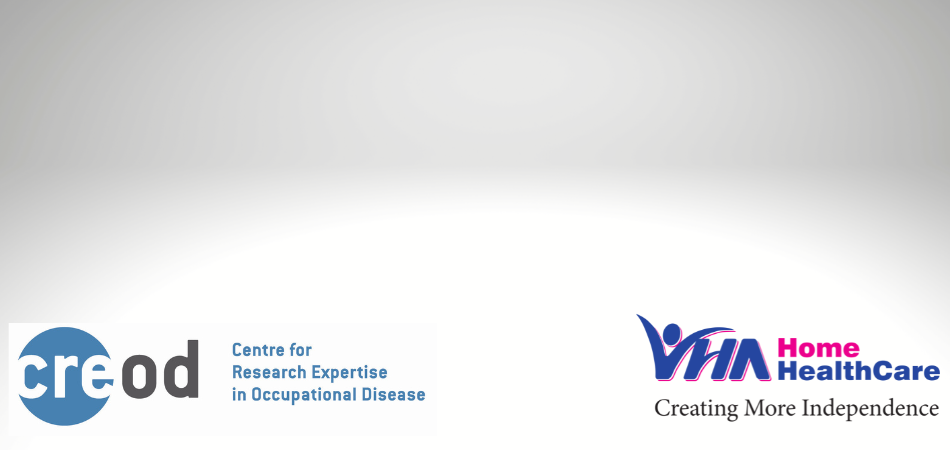VHA Symposium Focuses on Solutions for Occupational Health and Safety

VHA Home HealthCare (VHA), in partnership with the Centre for Research Expertise in Occupational Disease (CROED), hosted a symposium this spring to bring together a diverse group of stakeholders providing care and support to people at home and in the community, and representatives from the Ontario Ministry of Labour, Training and Skills Development.
The event highlighted research and recently created resources focused on the unique challenges faced by workers in these sectors which have been underscored by the COVID-19 pandemic.
The symposium connected researchers, service providers and government in an exchange of knowledge and shared experiences to identify opportunities to work collaboratively towards bridging the gaps and building a safer and healthier workforce. Read on to learn more about the unique research-based solutions presented.
Care Provider Safety – Mental Health, Facial Protection Use, and Dermatitis Education
Presented by: Emily King
Emily King, PhD is the Manager of Research at VHA and Assistant Professor at the University of Toronto’s Dalla Lana School of Public Health. A home care researcher for over 10 years, her focus is on understanding and improving home care providers’ health, safety, and quality of work life. Emily presented findings that provide a greater understanding of the interconnected stressors that are experienced by the PSW workforce during the global COVID-19 pandemic as well as a study that field-tested and identified solutions for the fogging of facial protective equipment.
How High-performing PSWs Set and Maintain Boundaries When Providing Care (Download PDF)
Presented by: Elizabeth Kalles
Elizabeth Kalles is a researcher focused on the intersection of health and care delivery in both home and community contexts. As a research assistant with the SE Research Centre, Elizabeth leads and facilitates projects on a wide range of research priorities including aging in society; dying, death, and grief; and health and care experiences. She is currently exploring how the mental health of older adults in Canada has been affected by the COVID-19 pandemic. Elizabeth’s presentation focused on the development of a boundary-maintenance framework to provide PSWs, supervisors and organizations with strategies to respond effectively when boundaries are challenged, recognizing that there is risk to both the PSW and the client if a boundary isn’t managed successfully.
MARCO Sector Pandemic Planning Initiative Evaluation (SSPI) (Download PDF)
Presented by: Barry Isaacs and Linn Holness
Barry Isaacs, PhD is the Director of Research, Evaluation and Education at Surrey Place in Toronto. He has been working as a researcher and program evaluation specialist in developmental disabilities for 30 years. His current research interests include homelessness, quality of life and the effects of the COVID -19 pandemic. Linn Holness, MD is the Director of CREOD, scientist in the MAP Centre for Urban Health Solutions, an occupational medicine physician at St Michael’s Hospital and a Professor Emerita at the Dalla Lana School of Public Health and Department of Medicine at the University of Toronto. Barry and Linn’s presentation highlighted how 28 diverse agencies collaborated through the SSPI to address safety, labour, policy, training needs, legal and ethical issues arising from the pandemic and developed resources to support agency management, staff and adults experiencing developmental disabilities.
Wellness Hub Research and Support Program
Presented By: Keelia Quinn de Launay
Keelia Quinn de Launay is a Research Coordinator on the Team of Implementation, Evaluation and Sustainability (TIES) within the Knowledge Translation (KT) Program in the Li Ka Shing Knowledge Institute at St. Michael’s Hospital, Unity Health Toronto. In the KT Program, Keelia supports a research project focused on applying KT science principles to support congregate living settings such as long-term care and retirement homes with implementing best practices in infection prevention and control, staff wellness, and vaccine confidence throughout the COVID-19 pandemic.
